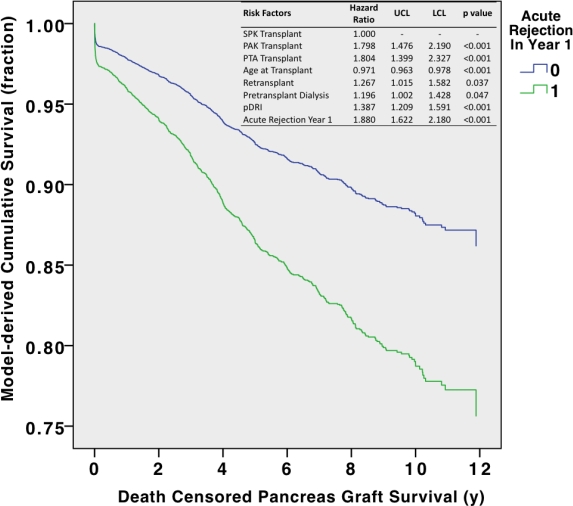Impact of Early Acute Rejection (AR) on Pancreas Transplant (PT) Outcomes.
University of Minnesota, Minneapolis.
Meeting: 2016 American Transplant Congress
Abstract number: 484
Keywords: Outcome, Pancreas transplantation, Rejection
Session Information
Session Name: Concurrent Session: Clinical Pancreas Transplantation 2
Session Type: Concurrent Session
Date: Tuesday, June 14, 2016
Session Time: 4:30pm-6:00pm
 Presentation Time: 4:54pm-5:06pm
Presentation Time: 4:54pm-5:06pm
Location: Room 210
Background: The role of early AR in long-term PT outcomes remains unclear. Despite reported high rate of AR (up to 40% in PTA), graft survival has significantly improved over the past decades. Several measures predict risk for rejection (ie, HLA matching), but do not impact graft survival. Our aim is to study the impact of early AR alone and in combination with other risk factors on graft survival using multicenter SRTR database.
Methods: We reviewed 22,142 PT that were reported to SRTR database (1998-2015). In addition to AR reported in the first year, donor and recipient demographics, surgical technique, and immune factors were include as covariates. Outcomes were studied using univariate analysis; significant factors were analyzed in multivariate system. Graft survival (GS), death censored graft survival (DCGS), patient survival (PS) were studied using Kaplan-Meier survival curve and Cox multivariate regression models.
Results: Overall acute rejection incidence in the first year ranged from 14.3% (SPK) to 16.7% (PAK) and 19.6% (PTA). In bivariate analysis AR predicted worse long term graft survival for all txp categories (all p < 0.001). Individual factors were incorporated in the Cox regression and excluded if P > 0.2. The model-derived DC graft survival and corresponding MV hazard ratios of significant factors is presented in Fig. 1. AR was associated with worse long term graft survival (p<0.001) with and 1.8-fold increased risk of graft loss. In KM analysis there was a decrease in patient survival for SPK (p<0.001) and PAK (p = 0.024) but not PTA (p = 0.369) recipients with AR. Similarly, there was a decrease in overall patient survival in MV analysis (HR 1.541, CI 1.333-1.782, p < 0.001) for patients with AR.
Conclusions: Pancreas transplants with AR in the first year following transplant have worse long term graft and patient survival compared to those with no rejection. Strategies aimed at reducing rejection risk may improve long term outcomes.
CITATION INFORMATION: Kirchner V, Dunn T, Kukla A, Kandaswamy R, Finger E. Impact of Early Acute Rejection (AR) on Pancreas Transplant (PT) Outcomes. Am J Transplant. 2016;16 (suppl 3).
To cite this abstract in AMA style:
Kirchner V, Dunn T, Kukla A, Kandaswamy R, Finger E. Impact of Early Acute Rejection (AR) on Pancreas Transplant (PT) Outcomes. [abstract]. Am J Transplant. 2016; 16 (suppl 3). https://atcmeetingabstracts.com/abstract/impact-of-early-acute-rejection-ar-on-pancreas-transplant-pt-outcomes/. Accessed February 22, 2026.« Back to 2016 American Transplant Congress
